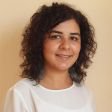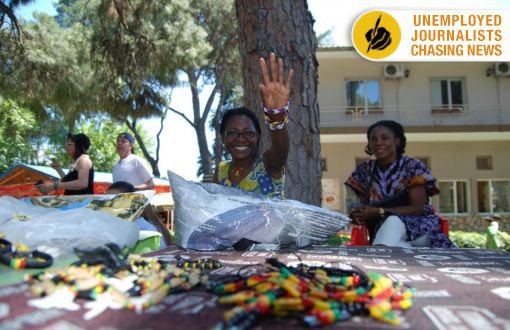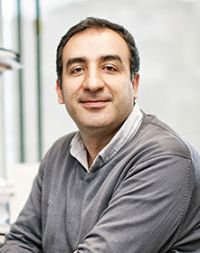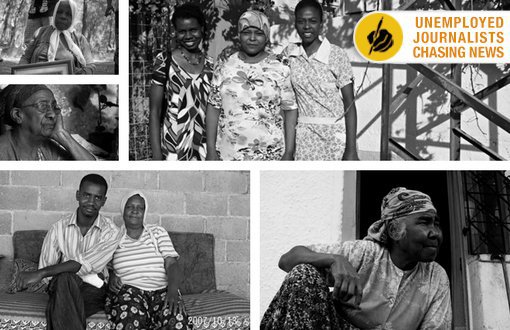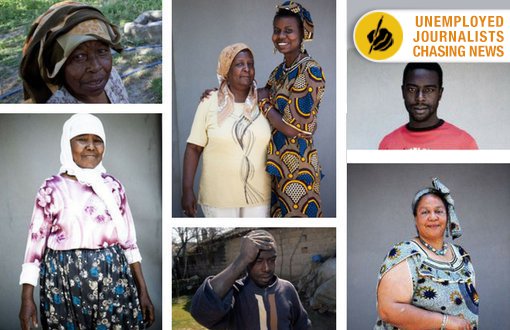Click to read the article in Turkish / Kurdish
A heterogeneous community, Afro-Turks work in various sectors. One of the more common job sectors is tourism. As a relatively more cosmopolitan sector, black people can find themselves a position more easily.
Field studies show that in the tourism sector, Afro-Turks are more likely to be employed in positions related to entertainment and communication, such as animators. Assistant Professor Lülüfer Körükmez emphasizes that the inclination to see black people as an element of entertainment is common in Turkey.
Afro-Turks who reside in rural contexts work in industrial agriculture or positions that require little qualification. Since many of them have little agricultural property, they also work as day laborers or seasonal employees.
“You will sit only at the tables in front of the bar”
The discrimination experienced by Afro-Turks in their work life usually occurs in one of two ways: Employers might not employ Afro-Turks due to their skin color, or they might employ them because it might be interesting.
Körükmez speaks of an example:
“An interviewee once told me something like this: He was offered a job in a bar in Alsancak and was told “You will sit only at the tables in front of the bar in order to attract customers.” So there are problems beyond our contemplation.
Sometimes people say “look, how sweet that he or she is employed”. No. This is a form of discrimination and it objectifies people before they get into production.”
They are often asked for a criminal record check
Black men might be associated with crimes such as drug dealing and smuggling due to their skin color. When they travel, they are often stopped and asked for a criminal record check.
The fact that a black person has a Turkish ID often makes security staff wonder, as a majority of society does not have any information about Afro-Turks.
Journalist Alev Karakartal says: “When we show them our ID, it’s not uncommon that they don’t believe us and take us to police headquarters for forging IDs.”
The number of those working in institutions and public services is few.
Körükmez says that the darker your skin is, the more unlikely the possibility that you get a job. She gives an example about how the skin color affects employment:
“We interviewed three siblings who are in their 30s. Each of them had rather different skin colors. One was black, one was like you would call a Latino, and the other was close to white. The black one was not able to find a job, and her little brother was accusing her of not explaining herself performing well enough in the job interviews. One day he said that he would come to the interview with her. He realized the situation then: the skin color made a difference.”
Türkkolu: When you move away from where you live, you become a stranger
.jpg)
Discrimination differs in urban and rural contexts. While there are fewer problems due to skin color in provinces and villages, in the city center discrimination increases. Beyhan Türkkolu, an Afro-Turk working in the tourism sector shares her experience:
“Since tourism is a universal job, my experiences were not too bad. Yet when you leave the region you live in, you encounter things. I reside in Eşrefpaşa and many people residing there are long-time locals. People know one another.
I am not seen as a stranger there. Yet, when I leave there and come to Alsancak, they insult me. Sometimes in English, sometimes in Turkish. Sometimes they point their fingers and call [me] Arab.”
Women have bigger issues
Afro-Turkish women have their share of the patriarchy, as suffered by the rest of the women in Turkey. Yet their problems are not limited to this.
Educated women with professional jobs are able to deal with the discrimination faced in their business and private lives more easily. Women who are employed as seasonal workers have a harder time to deal with this discrimination.
Karakartal says that in the upcoming periods there will be projects will bring in for the women: “These women are harassed more than others. They are employed without social security. While white women can demand social security, they cannot. For this reason, we tell the kids to seek a career.”
Kenan Çayır: The stereotypes should be stretched
The Istanbul Bilgi University Sociology and Education Studies Unit functions as a bridge between elementary school teachers and academia. It conducts studies to increase the knowledge sharing between the two fields. Prof. Dr. Kenan Çayır, director of the unit, which also carry studies on discrimination within education, emphasizes that an extensive study should be carried out in order to fight discrimination in education. He says that the stereotypes associated with certain communities is the foremost reason for discrimination and adds: “Research shows that there are various stereotypes concerning Afro-Turks. What leads to the discrimination are these stereotypes and labels associated with these. Primarily, these should be realized. Then studies can be conducted to challenge the stereotypes of school age children. This study can be done only through pictures in the textbooks. For instance, there are illustrations of children from various countries in the world. Yet Arabic and Chinese children are portrayed in ways that strengthen the stereotypes. To diversify the clothing of these children, to add different outfits to the traditional outfits is a simple yet important tool to stretch the stereotypes. Likewise, Afro-Turks should be considered with a pluralist mindset and their identities should be included in lessons in diverse ways.” Prof. Dr. Çayır emphasizes that teachers can develop mechanisms that prevent stereotypes and discrimination: “What is important is to take the scientific data and the needs of the research environment into consideration and to plan long-term studies.” |
(AT-FD/NU/HK)
Tomorrow: They Marry White People to Avoid Discrimination
***
UNEMPLOYED JOURNALISTS CHASING NEWS
1- Even Though They Speak Through Their New “Occupations,” They Are Journalists
2- Journalism is Banned under theState of Emergency
3- Germany: New Generation Diaspora/Kopuntu
4- Germany: Immigration of the Suffocated
5- The Organization that Made "The Arab Girl Looks from the Window"
6- How They Work/Cannot Work, Breaking Down the Stereotypes
7- They Marry White People to Avoid Discrimination
8- Private Rehabilitation Centers and Problems: The Example of Bingöl
9- Two Directors Discuss the “Educational Support for People with Disabilities” Practices
10- 'Solution is Inclusion System in Education for People with Disabilities'
11- Students and Parents from Bingöl Tell of Their Experiences* The "Unemployed Journalists Chasing News" project is being realized with the financial support of Matra-Human Rights Program of Consulate General of the Kingdom of the Netherlands.




